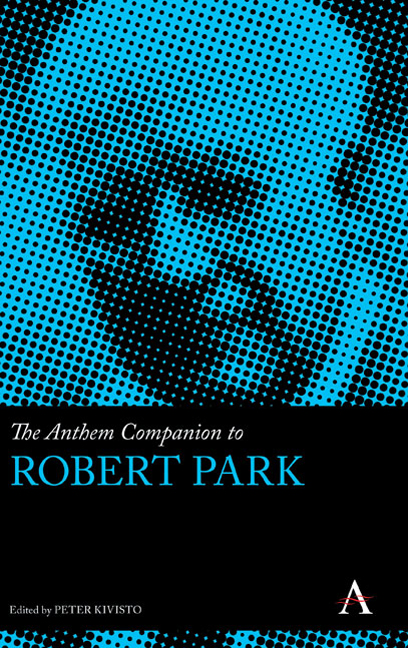Book contents
- Frontmatter
- Contents
- Introduction: The Legacy of Robert Ezra Park
- Chapter 1 A Twisted Path: Park, Gender and Praxis
- Chapter 2 Robert Park's Journey into Sociology
- Chapter 3 Beyond “Get the Seat of Your Pants Dirty in Real Research”: Park on Methods
- Chapter 4 The Basic Components of Social Action: Mead versus Park
- Chapter 5 Robert E. Park: Neglected Social Psychologist
- Chapter 6 Robert E. Park's Theory of Assimilation and Beyond
- Chapter 7 Robert Park's Marginal Man: The Career of a Concept in American Sociology
- Chapter 8 Marginality, Racial Politics and the Sociology of Knowledge: Robert Park and Critical Race Theory
- Chapter 9 The Cities of Robert Ezra Park: Toward a Periodization of His Conception of the Metropolis (1915–39)
- Chapter 10 The Impact of Robert E. Park on American Sociology of Religion
- Chronology
- Contributors
- Index
Chapter 2 - Robert Park's Journey into Sociology
Published online by Cambridge University Press: 10 January 2018
- Frontmatter
- Contents
- Introduction: The Legacy of Robert Ezra Park
- Chapter 1 A Twisted Path: Park, Gender and Praxis
- Chapter 2 Robert Park's Journey into Sociology
- Chapter 3 Beyond “Get the Seat of Your Pants Dirty in Real Research”: Park on Methods
- Chapter 4 The Basic Components of Social Action: Mead versus Park
- Chapter 5 Robert E. Park: Neglected Social Psychologist
- Chapter 6 Robert E. Park's Theory of Assimilation and Beyond
- Chapter 7 Robert Park's Marginal Man: The Career of a Concept in American Sociology
- Chapter 8 Marginality, Racial Politics and the Sociology of Knowledge: Robert Park and Critical Race Theory
- Chapter 9 The Cities of Robert Ezra Park: Toward a Periodization of His Conception of the Metropolis (1915–39)
- Chapter 10 The Impact of Robert E. Park on American Sociology of Religion
- Chronology
- Contributors
- Index
Summary
Robert Park entered the sociological realm via philosophy, and this starting point is the key to understanding his lasting influence upon the discipline and the important position he occupies in the Pantheon. His place in the history of sociology is not an uncontroversial one, but when examined critically many of the objections that have been raised against him are insubstantial. It is the aim of this chapter to identify the most important contributions made by Park, and to identify his most enduring legacies.
Before doing so, however, two standard criticisms of Park will be mentioned, since they are in this writer's view something of a caricature of Park's significance in the history of sociology. Mary Jo Deegan, in arguing the somewhat implausible case that Jane Addams was one of the early significant figures in Chicago sociology, presents Robert Park in an unfavorable light. The following is characteristic.
Park's life and work were affected by social reform, but he despised this association. Contradicting himself at each step, he wanted people to be more fair and democratic, while at the same time wanting to dissociate himself with activities demanding such changes. Egocentric, brusque, cantankerous and charismatic, Park profoundly embodied the conflicts of the new sociology. He legitimised a conservative political role for sociologists and left a legacy to future sociologists who worked to maintain the status quo while mildly condemning it. (Deegan 1988: 158; see also the preceding chapter)
This view is in my opinion a travesty of Park's significance, and one aim of this chapter is to provide a more measured view. That such a view may have value is suggested by Aldon Morris's recent argument that W. E. B. Du Bois is unjustly neglected as one of the founding figures of American sociology, predating the Chicago school. There is no doubt that Du Bois was a significant early figure in sociology and social research, but the deep- seated racism of the period meant that Du Bois had to operate in the segregated academic world of the time. Such was his frustration indeed that in 1910 he abandoned the academic world to join the National Association for the Advancement of Colored People (NAACP) in New York, where for 25 years he became editor of The Crisis.
- Type
- Chapter
- Information
- The Anthem Companion to Robert Park , pp. 37 - 50Publisher: Anthem PressPrint publication year: 2017

